Nissan Ariya VS Toyota C-HR – Specs, Efficiency & Price Comparison
Which model is the better choice – the Nissan Ariya or the Toyota C-HR? We compare performance (435 HP vs 223 HP), boot capacity (468 L vs 447 L), efficiency (17.70 kWh vs 0.80 L), and of course, the price (37300 £ vs 30000 £).
Find out now which car fits your needs better!
The Nissan Ariya ({ body-type_1}) is powered by a Electric engine and comes with a Automatic transmission. In comparison, the Toyota C-HR (SUV) features a Full Hybrid, Plugin Hybrid engine and a Automatic gearbox.
When it comes to boot capacity, the Nissan Ariya offers 468 L, while the Toyota C-HR provides 447 L – depending on what matters most to you. If you’re looking for more power, you’ll need to decide whether the 435 HP of the Nissan Ariya or the 223 HP of the Toyota C-HR suits your needs better.
There are also differences in efficiency: 17.70 kWh vs 0.80 L. In terms of price, the Nissan Ariya starts at 37300 £, while the Toyota C-HR is available from 30000 £.
Compare all the key specs now and find out which model fits your lifestyle best!
Nissan Ariya
The Nissan Ariya elevates the electric vehicle segment with its sleek design and advanced technology, providing a modern driving experience. Seamlessly blending comfort with performance, the Ariya offers an inviting and spacious interior that caters to both driver and passengers. Its innovative features make it a strong contender in the growing market for eco-friendly yet stylish automobiles.
details @ Nissan
@ Nissan
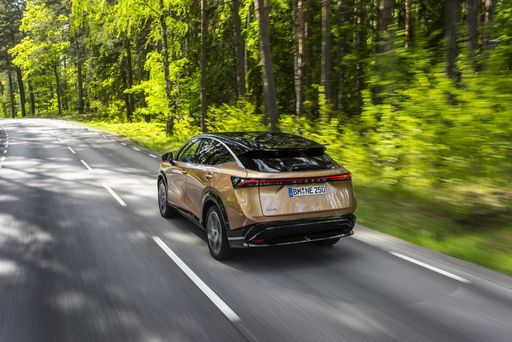 @ Nissan
@ Nissan
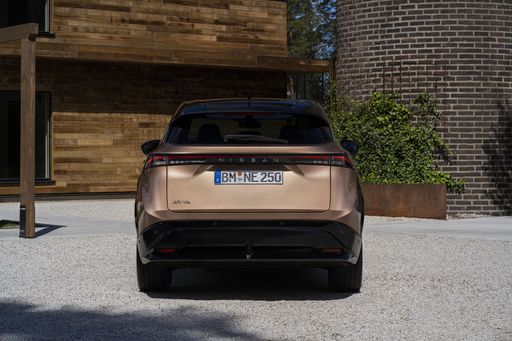 @ Nissan
@ Nissan
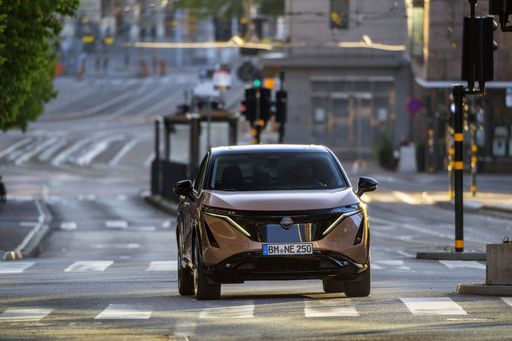 @ Nissan
@ Nissan
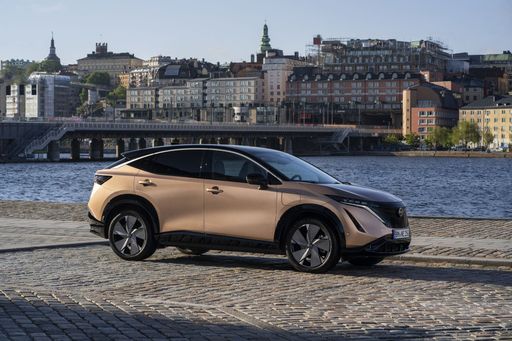 @ Nissan
@ Nissan
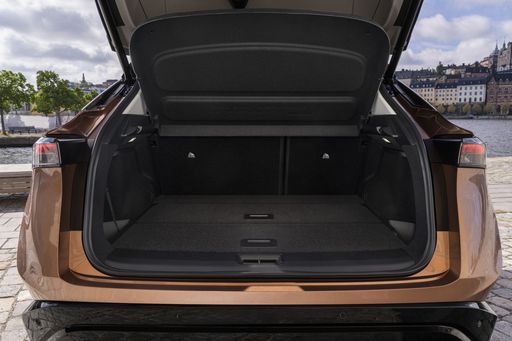 @ Nissan
@ Nissan
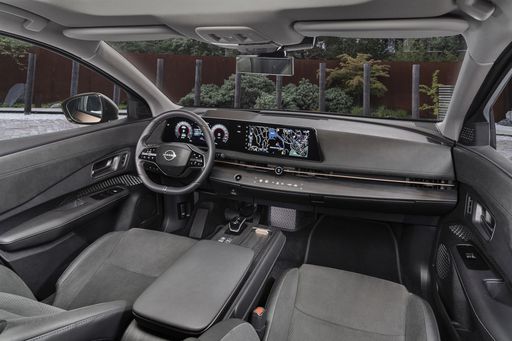 @ Nissan
@ Nissan
Toyota C-HR
The Toyota C-HR stands out with its distinctive and bold design that combines sleek, angular lines with a sporty posture. Its comfortable and stylish interior is equipped with advanced technology features, providing a seamless driving experience. The vehicle offers impressive handling and performance, making it a compelling choice for those who appreciate a blend of practicality and flair on the road.
details @ Toyota
@ Toyota
 @ Toyota
@ Toyota
 @ Toyota
@ Toyota
 @ Toyota
@ Toyota
 @ Toyota
@ Toyota

|

|
|
|
|
Costs and Consumption |
|
|---|---|
|
Price
37300 - 54800 £
|
Price
30000 - 42800 £
|
|
Consumption L/100km
-
|
Consumption L/100km
0.8 - 5.1 L
|
|
Consumption kWh/100km
17.7 - 24.5 kWh
|
Consumption kWh/100km
-
|
|
Electric Range
402 - 531 km
|
Electric Range
67 - 68 km
|
|
Battery Capacity
63 - 87 kWh
|
Battery Capacity
-
|
|
co2
0 g/km
|
co2
17 - 115 g/km
|
|
Fuel tank capacity
-
|
Fuel tank capacity
43 L
|
Dimensions and Body |
|
|---|---|
|
Body Type
SUV
|
Body Type
SUV
|
|
Seats
5
|
Seats
5
|
|
Doors
5
|
Doors
5
|
|
Curb weight
1980 - 2259 kg
|
Curb weight
1505 - 1755 kg
|
|
Trunk capacity
415 - 468 L
|
Trunk capacity
350 - 447 L
|
|
Length
4595 mm
|
Length
4362 mm
|
|
Width
1850 mm
|
Width
1832 mm
|
|
Height
1650 mm
|
Height
1558 - 1564 mm
|
|
Payload
396 - 420 kg
|
Payload
375 - 425 kg
|
Engine and Performance |
|
|---|---|
|
Engine Type
Electric
|
Engine Type
Full Hybrid, Plugin Hybrid
|
|
Transmission
Automatic
|
Transmission
Automatic
|
|
Transmission Detail
Reduction Gearbox
|
Transmission Detail
CVT
|
|
Drive Type
Front-Wheel Drive, All-Wheel Drive
|
Drive Type
Front-Wheel Drive, All-Wheel Drive
|
|
Power HP
218 - 435 HP
|
Power HP
140 - 223 HP
|
|
Acceleration 0-100km/h
5 - 7.6 s
|
Acceleration 0-100km/h
7.4 - 9.9 s
|
|
Max Speed
160 - 200 km/h
|
Max Speed
175 - 180 km/h
|
|
Torque
300 - 600 Nm
|
Torque
-
|
|
Number of Cylinders
-
|
Number of Cylinders
4
|
|
Power kW
160 - 320 kW
|
Power kW
103 - 164 kW
|
|
Engine capacity
-
|
Engine capacity
1798 - 1987 cm3
|
General |
|
|---|---|
|
Model Year
2022 - 2025
|
Model Year
2024 - 2025
|
|
CO2 Efficiency Class
A
|
CO2 Efficiency Class
C, B
|
|
Brand
Nissan
|
Brand
Toyota
|
Nissan Ariya
Unveiling the Nissan Ariya: Revolutionizing Electric Mobility
Nissan has taken a bold step into the electric future with the introduction of the Nissan Ariya, a sophisticated and stylish SUV designed to redefine the electric vehicle (EV) landscape. As the automotive industry evolves, the Ariya emerges as a frontrunner, blending cutting-edge technology and exquisite design to offer a unique driving experience. In this article, we delve into the technical specifications and innovative features that make the Ariya stand out in the electric vehicle market.
Striking Design Meets Practicality
The Nissan Ariya has a commanding presence on the road, thanks to its sleek and aerodynamic design, which is both functional and visually appealing. With dimensions of 4595 mm in length, 1850 mm in width, and 1650 mm in height, the Ariya maintains a robust stance while offering ample interior space. The five-door configuration and a trunk capacity of up to 468 liters ensure practicality for everyday use, whether it's a family outing or a shopping spree.
A Spectrum of Power and Performance
At the heart of the Ariya lies a versatile electric drivetrain that caters to various driving needs. The model is available in several configurations, with battery capacities of 63 kWh and 87 kWh, ensuring a balance between performance and range. The front-wheel-drive variants offer power outputs ranging from 218 HP to 242 HP, perfect for those looking for efficiency in urban settings. For enthusiasts seeking performance, the all-wheel-drive versions deliver up to 306 HP, while the Ariya Nismo tops the range with a thrilling 435 HP.
Advanced Battery Technology
The Ariya's advanced battery technology is engineered to provide long-lasting energy, with an electric range from 402 km to 531 km depending on the variant. The Ariya achieves this impressive range using a reduction gearbox and delivers efficient consumption ranging from 17.7 kWh to 24.5 kWh per 100 km. With a focus on sustainability, the Ariya boasts zero CO2 emissions, underscoring Nissan's commitment to a greener future.
Seamless Connectivity and Innovative Features
The interior of the Ariya is a blend of comfort and cutting-edge technology. Nissan has equipped the SUV with an intuitive infotainment system that integrates seamlessly with smartphones, offering features such as navigation, entertainment, and driver assistance technologies. The Ariya's cabin is designed for comfort, with ergonomic seating for up to five passengers. The vehicle's acceleration ranges from 5 to 7.6 seconds, ensuring a responsive and dynamic driving experience.
Safety and Assistance Redefined
Ensuring passenger safety, the Nissan Ariya is equipped with an array of driver assistance features, including adaptive cruise control, lane-keeping assistance, and an around-view monitor for enhanced visibility. These cutting-edge technologies work together to provide peace of mind for drivers and passengers alike, making every journey as safe and smooth as possible.
Conclusion: Driving into the Future
The Nissan Ariya represents a significant milestone in Nissan's electrification strategy, offering customers a blend of performance, innovation, and ecology. As the automotive world transitions towards sustainable solutions, the Ariya stands out as a testament to Nissan's dedication to pioneering the electric vehicle market. With ongoing advancements and its impressive suite of features, the Ariya is poised to redefine what drivers expect from an EV in terms of style, substance, and sustainability.
Toyota C-HR
Revolutionising the Crossover Segment: The Toyota C-HR
The Toyota C-HR has firmly established itself as a standout contender in the compact crossover segment. Known for its distinct design and hybrid capabilities, the C-HR continues to prioritise innovation and efficiency. In this article, we delve into the technical details that make the 2024 iteration a compelling choice for discerning buyers.
Distinctive Design and Aerodynamics
The Toyota C-HR boasts a striking design that combines angular lines with modern aesthetics. This isn't merely for show; the design enhances aerodynamics, improving fuel efficiency and handling. With dimensions of 4362mm in length and a sophisticated structure, the C-HR strikes a balance between urban agility and on-road stability.
Impressive Hybrid Powertrains
The C-HR lineup offers innovative hybrid and plug-in hybrid drivetrain options. The full hybrid system is tailored for those who seek both economic and environmental benefits. It combines a petrol engine with an electric motor to deliver power outputs ranging from 140 to 223 PS, achieving remarkable fuel consumption rates from 0.8 to 5.1 L/100km. The 2.0 Plug-In Hybrid variant impresses with an electric range of 67 km, ideal for urban commuters.
Unmatched Efficiency and Performance
Acceleration figures for the C-HR range from 7.4 to 9.9 seconds to reach 0-100 km/h, ensuring a responsive driving experience. Maximum speeds between 175 and 180 km/h cater to those who appreciate a bit of zest on the open road. Coupled with CVT automatic transmission and both front-wheel and all-wheel-drive configurations, the C-HR adapts to various driving conditions with ease.
Advanced Technology and Features
Inside, the C-HR is equipped with the latest technology aimed at providing connectivity and comfort. The model hosts an array of features across its diverse trim levels, including Business Edition, Lounge, and the sporty GR SPORT. Each variant is designed to meet the demands of different lifestyles, ensuring there's a C-HR model to suit every taste.
Sustainability and Cost Efficiency
With CO2 emissions ranging from 19 to 115 g/km, the C-HR stands as a testament to Toyota's commitment to sustainability. Financially savvy consumers will also appreciate the running cost, with monthly expenses from €959 to €1204, and a cost per km as low as 38.4 cents. Such efficiency makes the vehicle an attractive option for eco-minded buyers.
Conclusion: A Forward-Thinking Choice
The 2024 Toyota C-HR embodies Toyota's forward-thinking approach to automotive innovation, blending eco-friendly hybrid technologies with stylish design and practicality. It offers a glimpse into the future of driving, where efficiency meets elegance. Whether you're a city dweller or an adventure seeker, the C-HR promises a driving experience that is both enjoyable and environmentally conscious.
The prices and data displayed are estimates based on German list prices and may vary by country. This information is not legally binding.
